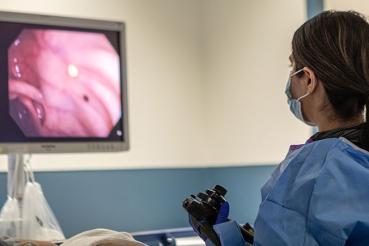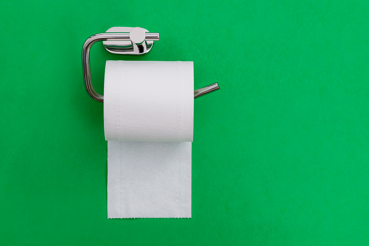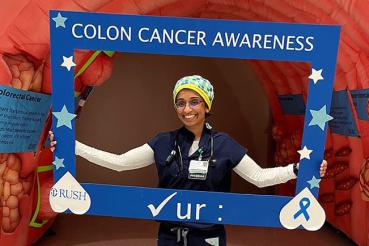A gastroenterologist sheds light on this autoimmune condition.
When Garth Swanson's patients learn they have been diagnosed with Crohn's disease, one of the first things they tend to do is seek out others who have it too — friends, family members, people online.
Finding a supportive community can offer relief at a stressful time, but the resulting conversations sometimes lead to confusion. "Comparing notes with another Crohn's patient can create misunderstandings," explains Swanson, MD, a gastroenterologist at Rush. "Because Crohn's disease is not Crohn's disease is not Crohn's disease. It's very, very different from person to person."
This is one of several things Swanson hopes his patients keep in mind:
1. Crohn's disease is different for everyone.
Crohn's, a type of inflammatory bowel disease (IBD), is an autoimmune condition. In people who have it, the immune system periodically attacks the gastrointestinal (GI) tract, leading to inflammation. These attacks, or flares, cause symptoms including abdominal pain, fever, diarrhea and rectal bleeding.
Crohn's can occur anywhere in the GI tract, but about 70 percent of the time it affects the bottom of the small intestine and the top of the large intestine. This is called ileocolonic Crohn's. About 30 percent of patients have Crohn's colitis, which affects only the large intestine.
Location of disease can cause some differences in symptoms, symptom severity and response to treatment. But these things differ widely even among people with the same type of Crohn's. Doctors don't yet know exactly what causes these differences.
2. It’s not your fault you have Crohn’s.
But doctors do know that diet is not the root cause of the disease — even though certain foods can aggravate flare-ups (see No. 6.)
"A lot of people think Crohn's is their fault," Swanson says. "I tell them, 'It isn't anything you ate or anything you did wrong. It's your genes combined with environmental factors that triggered an autoimmune response.' "
3. Medication can — and should — be tailored to your type of Crohn's.
While there isn't a cure for Crohn's, medications can prevent flares most of the time. But like the disease itself, the right treatment varies from person to person.
For people with Crohn's colitis, Swanson usually starts with a type of medication called 5-aminosalicylate acid (5-ASA), which works by directly soothing inflammation of the intestinal lining.
While this type of medication is good at reducing inflammation of the colon, it doesn't work very well on the small intestine. So for people whose disease affects any part of their small intestine, Swanson usually starts with an immunomodulator, which suppresses the immune system; a biologic, which works by preventing inflammation; or a combination of the two.
"If I start a patient on a biologic and they do great and stay in remission, we probably would just stay on that one medication," Swanson explains. "But if they stop responding to the medication, the next step might be combination therapy with an immunomodulator and a biologic."
4. Treatment should also be tailored to your life.
There are many different biologics available — including adalimumab (Humira), infliximab (Remicade), certolizumab (Cimzia). Another is ustekinumab (Stelara), which the FDA approved in September 2016 for the treatment of Crohn's.
When deciding which one might be best for which patient, Swanson considers more than just Crohn's. Ustekinumab, for example, is also a treatment for plaque psoriasis. Adalimumab and infliximab are also used to treat psoriasis, rheumatoid arthritis and ankylosing spondylitis. For Crohn's patients who have joint pain or skin lesions, a medication that also targets these problems can be a good choice.
Another difference is the way the medication is administered. You take infliximab only once every eight weeks, but it requires a visit to an infusion center. Adalimumab is an injection you can give yourself, but it has to be taken once every week or two.
"For a patient who travels a lot, making it to an infusion every eight weeks can be difficult," Swanson says. "So I might talk to them about starting on an injectable medication. I really try to make sure that the treatment fits the patient's life."
5. Remission doesn't mean you should stop taking medication.
Crohn's often goes into remission with the right medication. But that doesn't mean you should stop taking it.
"Stopping medication, even in patients who are inactive, is associated with a 40 to 50 percent risk that they're going to have a flare the following year," Swanson says. "And a flare can lead to hospitalization, surgery and other complications."
A small number of patients are able to stop taking medications. "When I see a patient doing extremely well — no flares for several years — then we're able to have that discussion," Swanson says.
6. If medications don't work, there are other options.
If medications don't sufficiently control symptoms, your doctor may recommend surgery. About two-thirds of people with Crohn's need surgery at some point, usually to remove damaged parts of their intestine.
In addition to gastroenterologists, Rush has colon and rectal surgeons who specialize in treating the condition.
Moderate alcohol intake (one drink a day for women or two for men) does not harm people with Crohn's. And because alcohol slightly suppresses the immune system, it may even have benefits.
7. You probably don’t have to restrict your diet.
As long as you're not having a flare, you probably don't need to restrict your diet.
"There are so many Crohn's diets out there," Swanson observes. "But because different people experience Crohn's so differently, a diet that may work for one patient may not work for somebody else."
If your disease is active, of course, you should avoid foods that might make it worse. These include milk, caffeine and certain high-fiber options such as nuts and popcorn. As long as it's inactive, though, you should aim to eat a wide range of healthy foods.
"Some complex, rich foods — such nuts, whole grains and dairy products — can help exercise your GI tract," Swanson explains. "You wouldn't tell someone with heart disease to stop exercising entirely so as not to stress their heart. In the same way, people with Crohn's need some exercise of the GI tract."
8. You don't need to stop drinking, either.
Swanson, who has conducted research on alcohol consumption and IBD, says drinking is okay too.
In clinical studies, he found that moderate alcohol intake (one drink a day for women or two for men) does not harm people with Crohn's. And because alcohol slightly suppresses the immune system, it may even have benefits.
But that's only if you don't drink too much. In Swanson's studies, heavy drinking was associated with increased intestinal permeability (when intestines allow substances to pass through them and into other parts of the body). This can lead to flares.
9. Good sleep habits can help prevent flares.
Poor sleep habits are another lifestyle factor that can make Crohn's worse.
Even when their disease isn't active, many Crohn's patients experience sleep disturbances and fatigue. To soothe these problems and help prevent future flares, Swanson advises patients to develop "extremely regimented" sleep habits.
That means going to bed and waking up at the same time every day — including weekends. And making sure you're sleeping long enough (seven to nine hours) each night. In his research on the sleep and wake cycles of people with IBD, Swanson has found that people who don't get enough sleep and people with irregular sleep schedules have more active disease.
If you have trouble falling asleep, Swanson recommends paying attention to your light exposure. "Light is the main driver of your body's circadian clock, so limiting nighttime light exposure is really important," he says. "Avoid screens before you go to bed. And, in the morning, make sure you get enough light to start your clock. Open your windows and let the morning light come in."
10. Reducing stress can also reduce flares
Along with a good night's sleep, stress reduction can help.
Researchers have found that stress-reducing activities can improve quality of life for Crohn's patients and decrease the risk of having a disease flare. These activities might include meditating, exercising, listening to music, and doing yoga or another relaxing activity you enjoy.
Swanson also recommends attending a support group. (Rush hosts one every other month for people with IBD.) "Even though the disease is different for different people," he says, "it's often a huge relief to be able to talk with your peers and share experiences and stories. To know that you're not alone."




